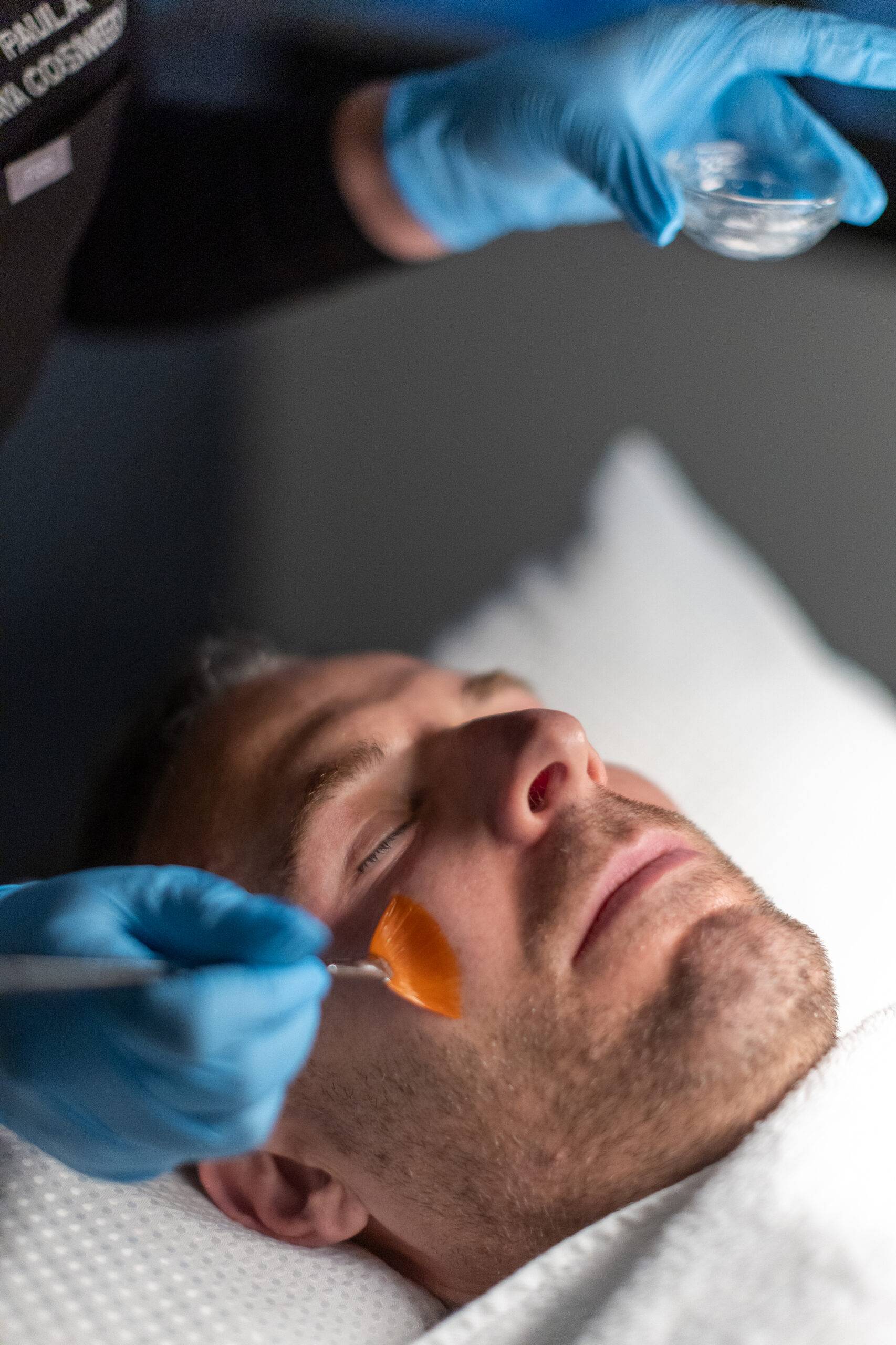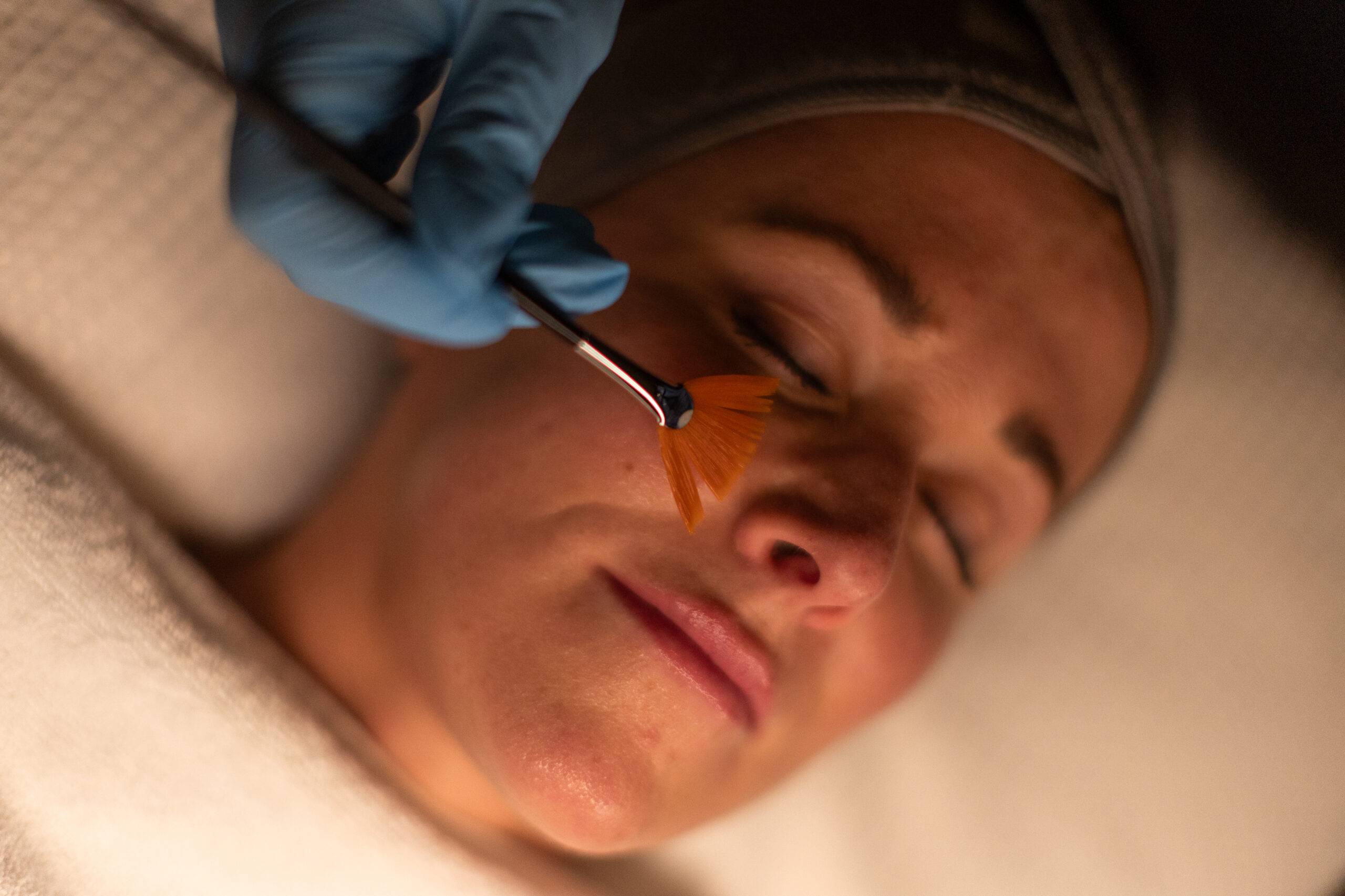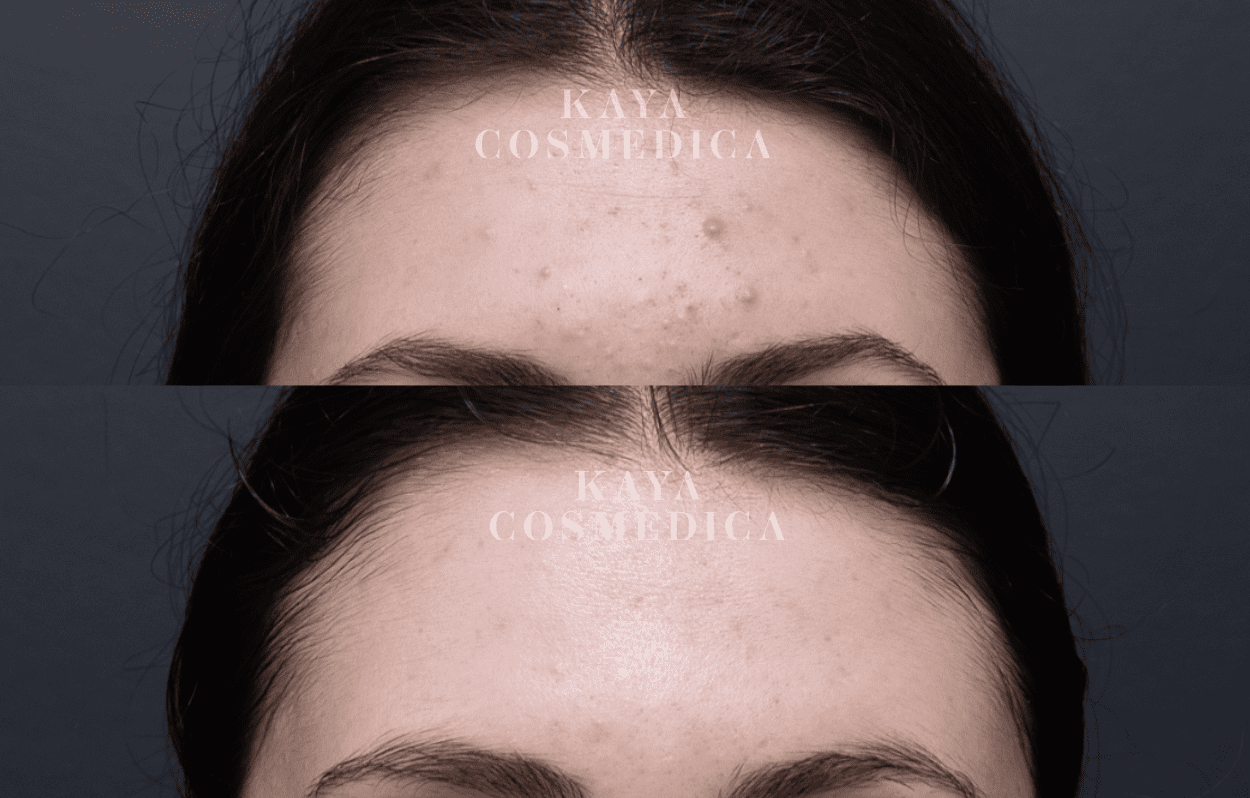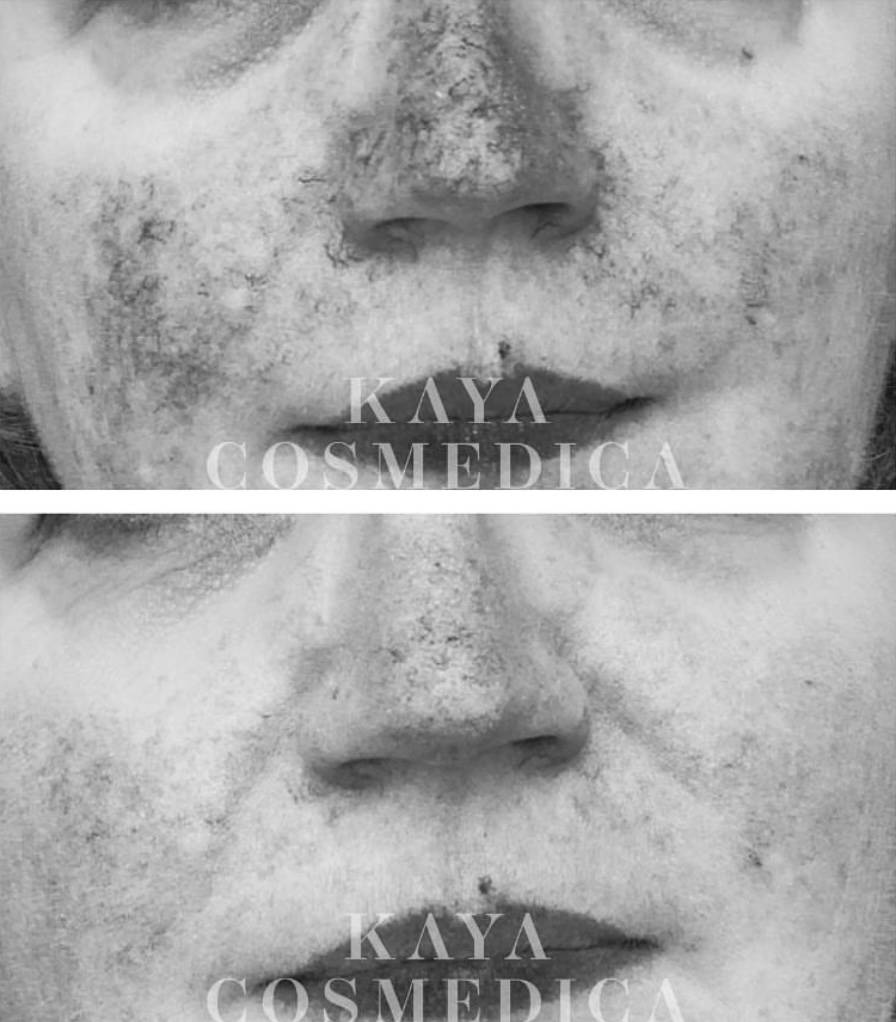Medical Peels

Medical peels are a versatile and powerful treatment option to address a wide range of skin concerns such as acne, sun damage, uneven skin tone, fine lines and dullness. At Kaya Cosmedica we tailor our medical peel treatments to offer a personalised solution to rejuvenate your skin. Medical peels are also great for combination treatments, enhancing results with minimal downtime.
TIME
15-30 minutes
DISCOMFORT
![]()
![]()
![]()
![]()
![]()
DOWNTIME
Minimal
LONGEVITY
6 months with a treatment course
SUITABLE FOR
All skin types. Fine lines, skin dullness, acne, inflammation, dryness, pigmentation
PREGNANCY SAFE?
Depends on type of peel
How Do Medical Peels Work?
Medical peels break down and remove the bonds holding the top layers of the skin together, eliminating damaged abnormal skin cells on the outer surface to reveal healthier skin cells underneath. Superficial imperfections like pigmentation marks may be removed during the procedure for a clearer complexion. The exfoliation process offered by the peel treatment also stimulates a controlled amount of inflammation and induces collagen remodelling, resulting in thicker, healthier skin over time and an improvement in your appearance overall.

What Concerns Can Peels Help With?
Kaya Cosmedica specialises in medical peels in South Melbourne. They are used to treat skin concerns such as:
- Ageing
- Sun damage
- Pigmentation
- Melasma
- Uneven skin tone and texture
- Fine lines and wrinkles
- Acne
- Acne scarring
- Redness
- Rosacea
Medical Peels Offered At Kaya Cosmedica
At Kaya Cosmedica we offer several types of medical peels – each are designed to target specific skin concerns, and can be combined to provide a complete and multilayered approach. Selecting a medical peel is determined during an assessment by your practitioner and depends on your individual skin type, concerns and desired outcomes..
Medical peels offered at Kaya Cosmedica include:
Enzyme Hydropeel
A synergistic blend of papaya enzyme and lactic acid that will stimulate cellular renewal and leave the skin looking soft, plump and hydrated with a radiant and dewy glow.
Recommended for: Premature ageing/Sun damage/Fine lines/Dehydration
Salicylic Acid Peel
Originally derived from the willowbark plant, salicyclic is closely related to aspirin. The Salicylic Acid Peel is a beta-hydroxy acid (BHA) peel which will unclog deep pores, address whiteheads and blackheads, exfoliate the skin and provide potent anti-inflammatory effects to reduce redness and irritation. These qualities make this peel treatment the ideal selection for acneic and congested skin types as well as rosacea sufferers when used at lower concentrations.
Recommended for: Congestion/Acne/ Rosacea
Lactic Acid Peel
A highly active yet gentle chemical exfoliation treatment. The Lactic Acid Peel amplifies the skin’s natural moisture properties, inhibits pigment production and stimulates cell renewal to help achieve firmer, hydrated, more evenly pigmented and glowing skin.
Recommended for: Fine lines & Wrinkles/Uneven skin tone/Sun damage/Age spots
Glycolic Acid Peel
Glycolic acid is an alpha hydroxy acid (AHA) that is derived from sugar cane. It is used to exfoliate and improve the appearance of the skin. It improves skin texture, stimulates collagen production, and is great for hyperpigmentation and acne.
Recommended for: Fine Lines & Wrinkles/Enlarged Pores/ Dull Skin/Hyperpigmentation/ Post inflammatory hyperpigmentation/Melasma
Tetra Acid 50 Peel
A potent 50% combination of mandelic, lactic, kojic and malic acid. It inhibits pigment production on a cellular level to brighten and even skin tone, whilst deeply exfoliating the outer layers to refine surface texture and reduce visible pores, fine lines and wrinkles.
Recommended for: Hyperpigmentation/ Post inflammatory hyperpigmentation/Melasma/Sun damage/ Fine lines/ Acne/Congested Skin
Modified Jessner Peel
A powerful layered peel with added kojic acid to address uneven skin tone, photo ageing, congestion and fine lines. With a potent combination of lactic acid, salicylic acid, resorcinol and kojic acid, the Modified Jessner Peel will purify and decongest whilst exerting pigment inhibiting, skin rejuvenating and anti-inflammatory effects.
Recommended for: Hyperpigmentation/Post inflammatory Hyperpigmentation/Melasma/Sun damage/ Fine lines/ Acne/Congested Skin
Pigment Balancing Peel
This high performance peel utilises brightening and anti inflammatory ingredients such as Vitamin C, Emblica and Glycolic acid to target hyperpigmentation, improving the uneven appearance of sun damage and mottled skin.
Recommended for: Sun damage/ Hyperpigmentation/ Post inflammatory hyperpigmentation, Melasma.


Frequently asked questions
An initial consultation with a practitioner at Kaya Cosmedica is essential to assess the skin, using the VISIA skin imaging system, take a thorough medical history, provide a diagnosis and individualised treatment plan for best results.
Prior to a medical peel, it is important to prepare the skin with active ingredients for at least 2-4 weeks to maximise results and ensure a safe and effective treatment. This will be detailed at the consultation. The use of daily sun protection is also essential. It is recommended that prescription retinoids are ceased 5 days prior to treatment. Proper preparation encourages better penetration of the peel, increases effectiveness, and reduces complications such as post-inflammatory hyperpigmentation.
When you come to Kaya Cosmedica for your treatment, we will start by cleansing your skin and applying a peel prep solution if needed. The peel is then applied for a prescribed period of five to 10 minutes. Your practitioner will closely supervise the process, consulting with you throughout the treatment to ensure your skin reacts well to the peel solution. There may be mild stinging while the ingredients work in the dermis. The peel is then neutralised, and serums and sunscreen are applied post-treatment to protect the skin and promote healthy healing.
The skin may be slightly red and irritated right after the procedure, but you can cover this with makeup after a few hours. There may be mild skin peeling three to five days post-treatment, depending on the type and strength of the peel, after which your complexion will look healthier and rejuvenated. We recommend keeping your skin protected from the sun for three to five days post-peel, as it will be especially sensitive to UV rays during peeling. It is important not to pick at any peeling as this can delay healing and increase the risk of infection and scarring. Your Kaya practitioner will provide more detailed aftercare instructions based on the type of peel administered.
Chemical peels are safe and effective if performed by a trained professional. You will be provided with all the information necessary to minimise the risks and ensure the best possible results from your treatment.
In some cases, abnormal pigmentation can occur. Patients can usually minimise side effects by avoiding the sun after treatment. If pigmentation does occur, prescriptive lightening creams are often recommended. Infection and scarring can also occur if the peeling skin is picked or scratched. These complications may require treatment with antibiotics or antivirals; however, prevention is always best.
Dr PK of Kaya Cosmedica has years of experience in the field and takes great care to deliver quality results. When selecting the practitioners that work at Kaya Cosmedica, Dr PK ensures that all have relevant experience and approach skin health and beauty with the same ethos and beliefs as she herself holds. Dr PK also trains all practitioners in her own methods before they treat any patients, as well as being heavily involved in all treatment protocols recommended to all patients.
Immediately following your treatment:
- For the first 8 hours avoid exposing the skin to water or adding additional products.
- If there is irritation and redness our practitioners will recommend applying a calming facial oil or recover balm. Avoid makeup unless instructed otherwise.
- For the first 12 hours following treatment, avoid heat or sweating, and exercise.
- For the first 48 hours, avoid sun exposure, saunas, spas or chlorinated pools.
- Limit stimulants like coffee and alcohol where possible, and avoid hot showers or friction to the face such as abrasive towels.
For 7 days following your treatment:
- Full sunscreen protection is recommended with a broad spectrum SPF 50, sun avoidance, hat and sunglasses.
- Cleanse the skin with a general cleanser and if the skin is irritated avoid actives (hydroxy acids, retinoids, Vitamin C) until this settles (usually within 1-5 days).
- Vitamin B can be reintroduced 48-72 hours following your treatment.
- Once all signs of inflammation has subsided (typically 3-5 days post treatment) resume a normal skincare regime.
- Peeling and flaking may occur at 3-5 days – do not pick, scratch or abrade the skin in the treated area. This will impact your results.
- Avoid facial waxing and shaving.
BOOK A CONSULTATION
Reveal Your Radiant Skin – Book a medical peel at Kaya Cosmedica today!
Medical peels in Kaya’s South Melbourne clinic are safe and effective. They are an efficient method of skin rejuvenation while treating various concerns and imperfections. To find out which facial peel is right for you, contact Kaya Cosmedica today at 03 9329 9991 to schedule your one-on-one consultation via our simple online booking form.
